英语基础教程第一册unit 5
- 格式:pptx
- 大小:24.54 MB
- 文档页数:30
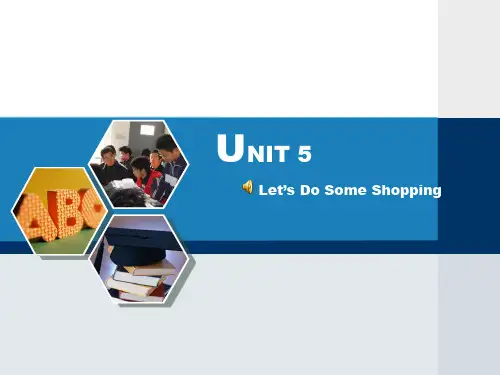
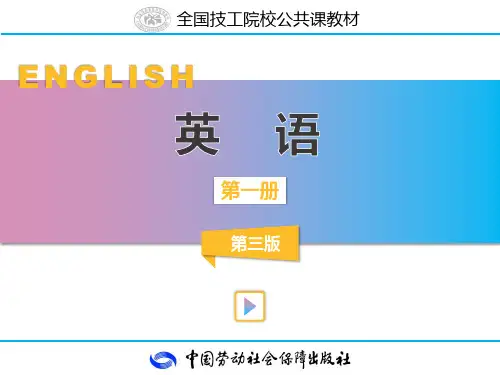
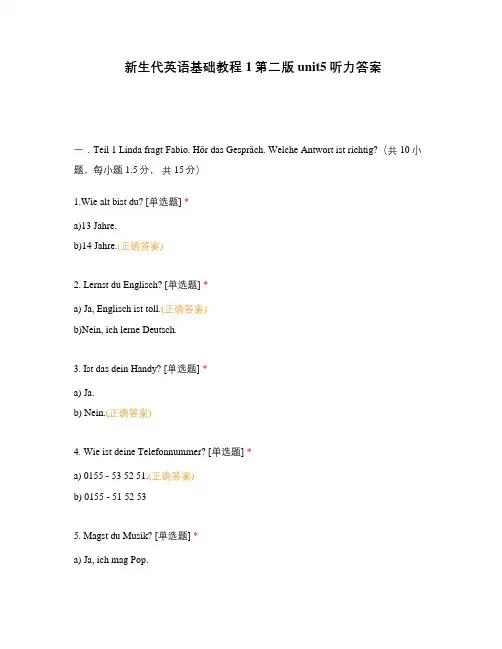
新生代英语基础教程1第二版unit5听力答案一.Teil 1 Linda fragt Fabio. Hör das Gespräch. Welche Antwort ist richtig?(共10小题,每小题 1.5分,共15分)1.Wie alt bist du? [单选题] *a)13 Jahre.b)14 Jahre.(正确答案)2. Lernst du Englisch? [单选题] *a) Ja, Englisch ist toll.(正确答案)b)Nein, ich lerne Deutsch.3. Ist das dein Handy? [单选题] *a) Ja.b) Nein.(正确答案)4. Wie ist deine Telefonnummer? [单选题] *a) 0155 - 53 52 51.(正确答案)b) 0155 - 51 52 535. Magst du Musik? [单选题] *a) Ja, ich mag Pop.b) Ja, ich mag Hiphop.(正确答案)6. Kennst du Casper? [单选题] *a) Ja.b) Nein.(正确答案)Teil2 Was ist das? Hör die Gespräche.7Frau Milan kommt aus [单选题] *a) Münchenb)Stuttgart(正确答案)8.Sie ist [单选题] *a) verheiratetb)nicht verheiratet(正确答案)9.Sie hat a) ein Kind b) zwei Kinder [单选题] *a) ein Kind(正确答案)b) zwei Kinder10.Frau Milan kann [单选题] *1a) kochen2b) nicht kochen(正确答案)Teil 3 Hör das Gespräch und beantworte die Frage (共10小题,每小题1.5分,共15分)11. Was macht Tina gerade? [单选题] *a) Hausaufgabeb) Klavier üben(正确答案)c) Englisch lernen12.Tina hat Zeit um... [单选题] *a) 16:30.b) 17:30.(正确答案)c) 18:30.13.Marc möchte gern... [单选题] *a) Tennis spielen(正确答案)b) Fahrrad fahrenc) Fußball spielen14.Marc....[单选题] *a) fährt mit dem Fahrrad.b) holt Tina ab.c) trifft Tina am Schwimmbad(正确答案)Du hörst zwei Gespräche. Kreuze richtig(a) oder falsch(b).Gespräch 115.Sarah kocht heute Suppe. [单选题]R(正确答案)F16.Sarah braucht noch Gemüse. [单选题]RF(正确答案)17.Ihr Papa kauft auf dem Markt ein. [单选题] *RF(正确答案)18.Frau Huber isst heute im Restaurant. [单选题] RF(正确答案)19.Der Vater von Tom hat Geburtstag. [单选题]R(正确答案)F20.Andrej muss morgen nicht zur Schule. [单选题] R(正确答案)F。
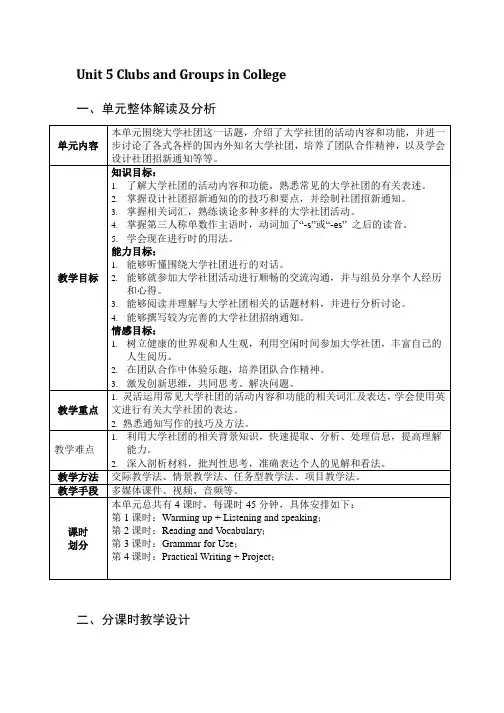
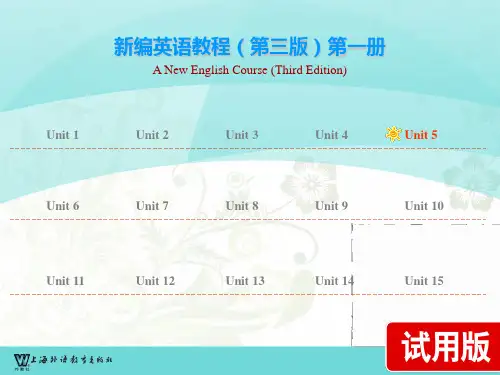
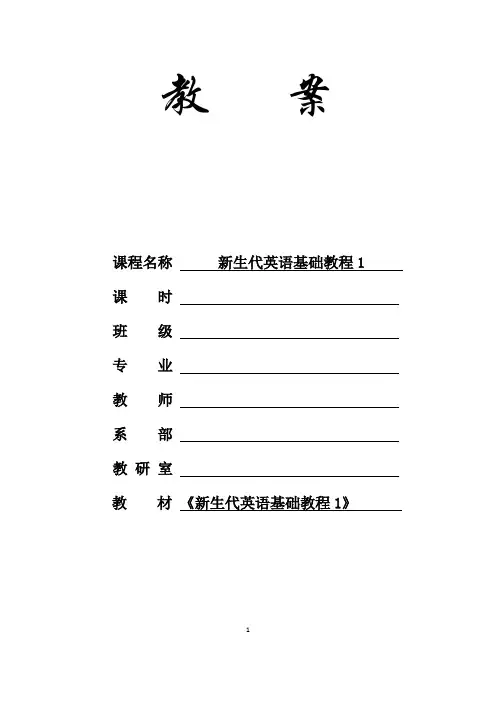
教案课程名称新生代英语基础教程1 课时班级专业教师系部教研室教材《新生代英语基础教程1》1345678补充教学资源VOCABULARY BUILDERSHOW TIME➢语言解析1. You’ll get used to it pretty soon.你很快会习惯这儿的。
get used to习惯,适应e.g. I have got used to working on challenging tasks.我已经习惯做有挑战性的工作了。
2. We take the Number 3 to Glendale Community College.我们坐3路车到格兰岱尔社区大学。
1) community college社区大学e.g. My mum went to a community college to learn ikebana after her retirement.我妈妈退休后,去社区大学学习插花。
2) take the No…乘……路车(公交车)e.g. You can take the No. 6 to the amusement park.你可以乘6路车去游乐园。
3. First we take the Number 11, get off at the Galleria Mall…首先,我们乘11路公交车,在加乐利亚购物中心下车……get off 下车e.g. The bus driver got the passengers off in time.公共汽车司机让乘客及时下了车。
4. What a coincidence! 真巧啊!10coincidence 一致;巧合e.g. By coincidence, his wife is one of my classmates in college.巧合的是,他的妻子是我的大学同学。
It was no coincidence that his car was seen near the bank at the time of the robbery.劫案发生时有人看见他的车停在银行附近,这绝非巧合。
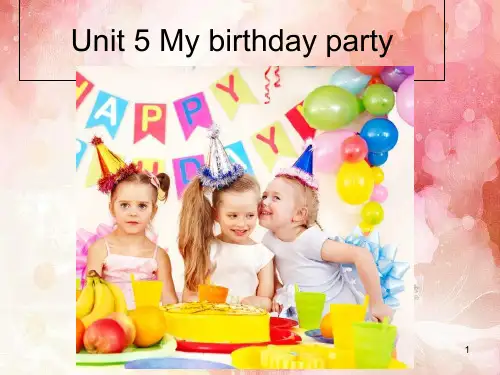
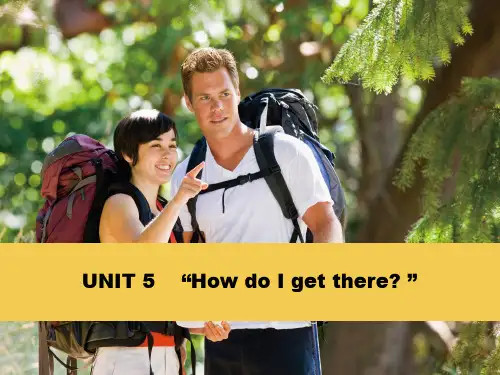
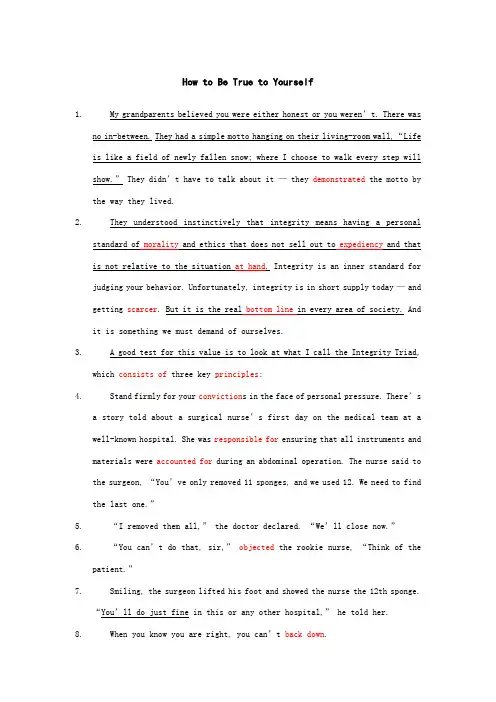
How to Be True to Yourself1.My grandparents believed you were either honest or you weren’t. There wasno in-between. They had a simple motto hanging on their living-room wall,“Life is like a field of newly fallen snow; where I choose to walk every step will show.”They didn’t have to talk about it — they demonstrated the motto by the way they lived.2. They understood instinctively that integrity means having a personalstandard of morality and ethics that does not sell out to expediency and that is not relative to the situation at hand. Integrity is an inner standard for judging your behavior. Unfortunately, integrity is in short supply today —and getting scarcer. But it is the real bottom line in every area of society. And it is something we must demand of ourselves.3. A good test for this value is to look at what I call the Integrity Triad,which consists of three key principles:4. Stand firmly for your conviction s in the face of personal pressure. There’sa story told about a surgical nurse’s fir st day on the medical team at awell-known hospital. She was responsible for ensuring that all instruments and materials were accounted for during an abdominal operation. The nurse said to the surgeon, “You’ve only removed 11 sponges, and we used 12. We ne ed to find the last one.”5.“I removed them all,” the doctor declared. “We’ll close now.”6.“You can’t do that, sir,” objected the rook ie nurse, “Think of thepatient.”7. Smiling, the surgeon lifted his foot and showed the nurse the 12th sponge.“You’ll do just fine in this or any other hospital,” he told her.8.When you know you are right, you can’t back down.9. Always give others credit that is rightfully theirs.Don’t be afraid ofthose who might have a better idea or who might even be smarter than you are.10. David Ogilvy, founder of the advertising firm Ogilvy & Mather, made thispoint clear to his newly-appointed office heads by sending each a Russian nesting doll with five progressively smaller figures inside.11. His message was contained in the smallest doll,“If each of us hires peoplewho are smaller than we are, we shall become a company of dwarfs. But if each of us hires people who are bigger than we are, Ogilvy & Mather will become a company of giants.” And that is precisely what the company became — one of the largest and most respected advertising organizations in the world.12. Be honest and open about what you really are. People who lack genuine corevalues rely on external factors — their looks or status — in order to feel good about themselves. Inevitably they will do everything they can to preserve this façade, but they will do very little to develop their inner value and personal growth.13.So be yourself. Don’t engage in a personal cover-up of areas that areunpleasing in your life. When it’s tough, do it tough. In other words, face reality and be adult in our responses to life’s challenges.14. Self-respect and a clear conscience are powerful components of integrityand are the basis for enriching your relationships with others.15.Integrity means you do what you do because it’s right and not justfashionable or politically correct. A life of principle, of not succumbing to the seductive sirens of an easy morality, will always win the day. It will take you forward into the 21st century without having to check your tracks in a rearview mirror. My grandparents taught me that.Paragraphs 1-2Words and Expressions1. demonstrate vt.1) show; make clear. These figures clearly demonstrate the size of the economic problem facing the country.Research has demonstrated that babies can recognize their mother’s voice very soon after birth.2) make a public expression that you are not satisfied about something, especiallyby marching orhaving a meeting. Thousands of people gathered to demonstrate against the new proposals.成千上万的人一起游行示威反对新提议。
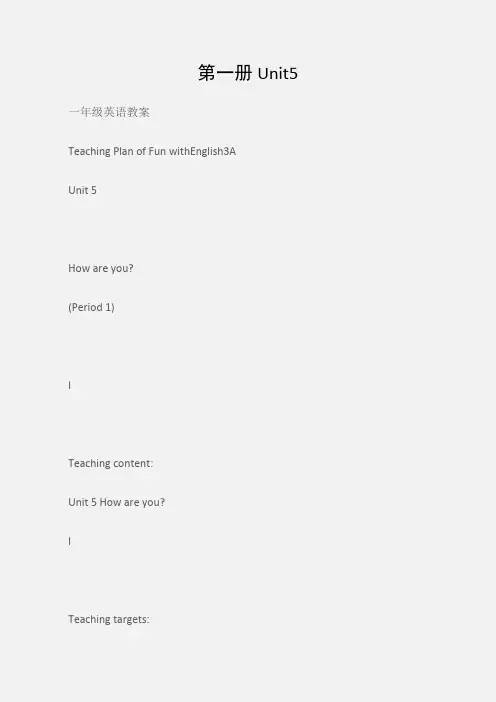
第一册Unit5 一年级英语教案Teaching Plan of Fun withEnglish3AUnit 5How are you?(Period 1)lTeaching content:Unit 5 How are you?lTeaching targets:1. Aim of knowledge:Pupils are able to read and speak out drills: How are you? Fine, thank you. And you?Not bad, thank you. Not so good. I’m sorry.2. Aim of ability:Pupils are able to inquire someone’s health.3. Aim of emotion:Pupils are interested in singing : GoodbyelFocal points:Drills: How are you? Fine, thank you. And you?Not bad, thank you. Not so good. I’m sorry.lDifficult points:Answer one’s inquiring according one’s own status.lTeaching aids:Tape cassette, recorderlTeaching steps:Step 1.SingingSing a song: GoodbyeStep 2Presentation(T) Hello, boys and girls, how are you today?(Ss) Fine, thank you. And you?(T) Not bad, thank you.(S1) Hello, Miss Yang. How are you?(T) (pretend to catch a cold)Not so good.(T Ss) I’m sorry.Step 3Practice(T) How are you today?(S1) Fine, thank you. /Not bad, thank you. / Not so good. Step 4Listening& Reading(Ss) Read after the tape , then read after the teacher Read togetherDesign of writingUnit 5 How are you?How are you?Fine, thank you./ Not bad, thank you. / Not so good.Teaching Plan of Fun withEnglish3AUnit 5How are you?(Period 2)lTeaching content:Unit 5 How are you?lTeaching targets:1. Aim of knowledge:Pupils are able to read and speak out new words: pencils, pens, rulers, pencil boxes, ball pens, pencil sharpeners, rubbers, books2. Aim of ability:Pupils are able to get idea about plural forms.3. Aim of emotion:Pupils are interested in asking and answering about their own stationaries.lFocal points:Words of plural forms: pencils, pens, rulers, pencil boxes, ball pens, pencil sharpeners, rubbers, bookslDifficult points:Correct pronunciation of plural forms.Teaching aids:Tape cassette, recorder, some pictures.lTeaching steps:Step 1Free talk:How are you?Fine, thank you. And you? Not bad, thank you. Not so good. I’m sorry.Step 2Presentation(T) ( Present a pen) What’s this?( Present two pens) What are these?( Read: pens)(Same method as teaching : pencils, rulers, pencil boxes, ball pens, pencil sharpeners, rubbers, books)Step 3Practice(Ss) Ask and answer about one’s stationary.Step 4A game( Guess and say) ( Touch and say) Step 6Listen and circleDesign of WritingUnit 5How are you?Teaching Plan of Fun withEnglish3A Unit 5How are you?(Period 3)lTeaching content:Unit 5 How are you? (period 3)lTeaching targets:1. Aim of knowledge:Revise words: pencils, pens, rulers, pencil boxes, ball pens, pencil sharpeners, rubbers, books and drills: How are you? Fine, thank you. And you?Not bad, thank you. Not so good. I’m sorry.2. Aim of ability:Pupils are able to get idea about plural forms.3. Aim of emotion:Pupils are interested in asking and answering about their own stationaries.lFocal points:Exercises of Unit 5lDifficult points:Correct pronunciation of plural forms.lTeaching aids:Tape cassette, recorder, some stationary. lTeaching steps:Step 1SingingHello! How are you? Step 2Presentation1.Listen and respond 2.Listen and colour 3.Listen and drawStep 3Practice(Ss) Ask and answer about stationary.Step 4A game( Guess and say) ( Touch and say) Step 5Listen and circleHomework1. Read Unit 5.2. Copy the letters.教学后记:Not so good.和Not bad有个别学生搞不清楚,容易混淆,在接下来的每日英语中要多加练习。
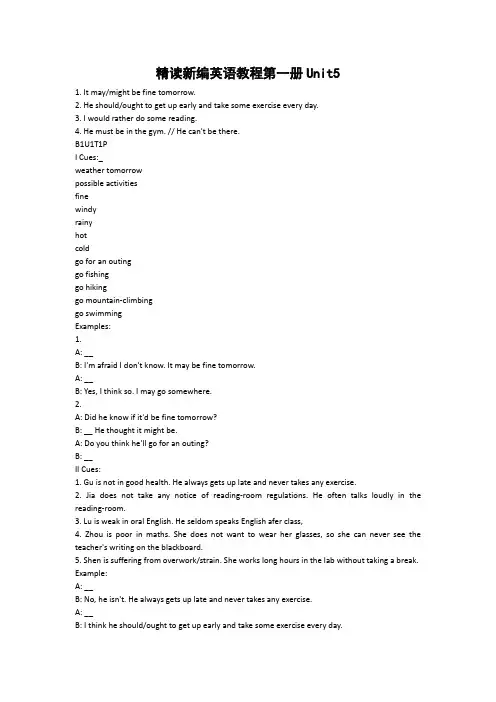
精读新编英语教程第一册Unit51. It may/might be fine tomorrow.2. He should/ought to get up early and take some exercise every day.3. I would rather do some reading.4. He must be in the gym. // He can't be there.B1U1T1PI Cues:_weather tomorrowpossible activitiesfinewindyrainyhotcoldgo for an outinggo fishinggo hikinggo mountain-climbinggo swimmingExamples:1.A: __B: I'm afraid I don't know. It may be fine tomorrow.A: __B: Yes, I think so. I may go somewhere.2.A: Did he know if it'd be fine tomorrow?B: __ He thought it might be.A: Do you think he'll go for an outing?B: __II Cues:1. Gu is not in good health. He always gets up late and never takes any exercise.2. Jia does not take any notice of reading-room regulations. He often talks loudly in the reading-room.3. Lu is weak in oral English. He seldom speaks English afer class,4. Zhou is poor in maths. She does not want to wear her glasses, so she can never see the teacher's writing on the blackboard.5. Shen is suffering from overwork/strain. She works long hours in the lab without taking a break. Example:A: __B: No, he isn't. He always gets up late and never takes any exercise.A: __B: I think he should/ought to get up early and take some exercise every day.III Cues:What do you prefer to do this weekend?do some readingnovels / short stories / plays/ newspapers / magazineswatch TVTV serial / world news / musical performance / live transmission of sports events / the "Man and Nature"programmetake some exercisejog / do swordplay / do shadow-boxing / play ball games(basketball / volleyball / football / tennis / table tennis)Example:A: __B: I'd rather do some reading.A: __B: Short stories, of course.IV Cues:ActivityPlaceplaying basketballnot in the gym, but in the playing fielddo some readingnot in the reference room, but in his studylisten to language lesson tapesnot in the language lab, but in the classroompaint a picturenot in the studio, but in her own roomplay chessnot in the clubhouse, but in his homeExample:A: __B: He must be in the gym.A: But he can't be there.B: In that case, he must be in the playing-field.B1U4T1DA Trip to ChinaA: Hi, Bob. Fancy meeting you here.B: Oh, Ted. Good to see you again. How have you been?A: Pretty good. I've just returned from China, you know.B: Terrific! I'd really like to visit China myself one of these days. I haven't had the opportunity so far. Where did you go in China?A: Lots of places... world-renowned places like the capital Beijing, prosperous Shanghai, the historic city Xi'an — China's ancient capital on and off for several hundred years — and the scenic Guilin, and, oh, yes,"hot and spicy" Chengdu. I also visited many other places of historical interest and many famous mountains and great rivers, too.B: Lucky you. China's huge size and that rich cultural legacy of 5,000 years of civilization have always captured my imagination. I envy you.A: Well, China's tourist resources are inexhaustible and all that I have seen is only the tip of the iceberg.B: Which place impressed you the most?A: I would say the two-thousand-year-old terracotta warriors and horses in Xi'an. I was there exactly two weeks ago today.B: I read about them somewhere, and I've seen the pictures in National Geographic. Amazing... Unbelievable, I'd say.A: Yes, the Xi'an trip was quite an experience. I saw row upon row of life-size warriors and horses, so true to life. It was a breathtaking experience walking past them. Tell you what, no two warriors look alike. Each wears his own facial expression and has his own personality. And the horses... oh, they look so alive.B: Sounds fantastic!A: There was something even more fantastic than the terracotta army. Guess what...B: Hot springs? Pagodas?Giant pandas? I've no idea.A: Chinese food, authentic Chinese cooking that is unparalleled anywhere else in the world. I'd go back to China again just for those spicy-hot Sichuan dishes. There's really nothing like Sichuan food.B: You make my mouth water. I think I might also take a trip to China to see terracotta warriors and enjoy some real Chinese food.A: But if you say you will eat Chinese food, you're taking too much for granted. As a matter of fact, there's no such thing as so-called "Chinese food."B: I don't understand what you're saying.A: Let me put it this way. China is such a large country that there are numerous cooking styles that are vastly different from each other. One may prefer a particular Chinese food or a particular regional way of cooking.B: It's not easy to order food in China's restaurants, then.A: There is an easy way. For me, that is ordering Chinese food by the names of famous dishes rather than by any prevailing style. For example, if you like hot and spicy food and don't want to gain extra weight, you can order MapoDoufu, a famous dish of hot and spicy bean curd.B: Well, in that case I'll ask for your company when I've made up my mind to visit China.B1U4T1RTalking About Eating HabitsSituations:Mr. Green, an American professor teaching in one of the universities in China, is now having lunch with Mr. Sun, one of his colleagues, in the school canteen. While eating, they are comparing the eating habits in the two countries.Eating HabitsChineseAmerican1. lunch - meat or fish, some vegetable ricesoup with lunch, no water2. breakfast - people in the south prefer congee, a few pickled vegetable and some steamedbread while people in the north tend to have noodleds and steamded bread3. dinner - several dishes such as meat/fish/egg,vegetables, soup, rice beverage - only for special occasion no dessert after the meal(only for special occasions)4. less meat and a large portion of vegetable1. lunch - a sandwich or some salad or Burger and friesMost people prefer a soda with lunch2. breakfast - traditional breakfast includes eggs, bacon or sausage, toast or biscuits, milk, juice or cerealMost people have coffee, donuts and/or cereal on workdays and eat on the run3. dinner - Meat like meatloaf, ham, chicken, roast beef, steak. pork chop or fish; rice or potato, vegetable or casserole, soup with sandwich or pizza, or spaghetti with salad and garlic bread milk or juice with dinner4. more meat and a small portion of vegetableRoles:Mr. Green - very interested in the Chines diet.He asked Mr. Sun many questions and compares the Chinese diet with that of his country.Sun - pleased to introduce to Mr. Green the Chinese eating habits.He was also curious about the American food and asked Mr. Green some questions.B1U4T1RIHuman NeedsWhen we speak of a basic human need we mean something which is necessary to life, something that we cannot possibly do without. Food is a basic human need. Without it we would starve to death. However, if we have plenty of food,but of the wrong kind,our bodies will suffer from a lack of the right food.This is known as malnutrition.In primitive countries man's food needs are the same as in the more advanced societies like our own. We all need food and could manage to live a healthy life on the limited types of food. Primitive people eat only the foods which can be grown near their homes, whereas we eat foods which are often grown many thousands of miles away from our homes.Primitive people are satisfied with less variety than we are, and therefore we can say that although their needs are like our own their wants are different. Just think of the different types of meat we eat: beef, mutton,pork,chicken,turkey, goose,and rabbit.We could manage on a diet of one kind of meat, but how monotonous it would become! Even turkey, which most of us eat only at Christmas,would become monotonous if we ate it every day.Yet we cannot live on meat alone. We need foods like bread and fruit to provide us with other essential nutrients which we need to keep out bodies healthy.We can agree with primitive man that food is a basic need,but we differ from him in our food wants because of the wide variety of food we have available compared with him;we have a wider choice.Take fruit,for example. Not only can we enjoy the fruits grown in this country, but, because of modem methods of transport and food preservation,we can also enjoy the more exotic fruits from countries thousands of miles away, whereas primitive man is limited in his choice to the kinds of fruit which actually grow where he lives.The same is true of the second of our human needs.Clothing is necessary to regulate the heat of our bodies.Since we live in a temperate climate we need more clothes than people living in tropical countries, but less than people living in arctic conditions.Likewise,our clothing needs tochange with the seasons.In summer we need light clothing while in winter we need to muffle ourselves to keep warm.Shelter, the third of our needs,depends upon the climate, the skill of the builder, one's social position, and the materials available. The simple shelter of the aboriginal would not do for us,and yet it satisfies his needs.The three-bedroomed suburban house of the average family would not be grand enough for a very rich family, and yet the modern house contains many of the material comforts which were denied to the kings and queens of the old days.B1U4T1RIIBreadIn man's early progress toward civilization, there were many great steps forward —the domestication of animals, the invention of the wheel, the development of writing, the use of money, the growth of commerce and cities. But the most important step of all was the beginning of agriculture. If man had remained a hunter, none of the rest of his accomplishments would have been possible.We don't know how agriculture began. It is probable that the first crops that were grown for food were grains, such as wheat, barley, rye, oats, and rice. From these grains, one of man's most important foods — bread — is made.Bread is essentially nothing more than a mixture of flour and water which can be cooked and eaten. Flour can be made from many different crops. For example, it can be made from manioc root, or from potatoes or bananas. The Indians of the New World made flour from Indian corn, or maize, and people in the United States still like cornbread. No one knows how man discovered that wheat could be made into bread, though it is certain that the first wheat was wild grass. Wheat is the most important grain from which flour can be made. This is because leavened bread can be made from wheat flour. Wheat can be grown almost all over the world. The people of the New World did not have wheat until it was introduced by the Europeans in about 1530. It is a major crop in the Mediterranean countries, in France and England, and in Pakistan. It is a major crop in India and China, too, even though in these countries rice is the main food. Five countries usually produce a large surplus of wheat, that is, they grow more wheat than they need for their own use and are able to export it to other countries. They are the United States, Canada, Australia, the Soviet Union, and Argentina.Making bread out of wheat is a long and complicated process. First, the land must be ploughed. When the ground is ready, the seed is planted in the ground. In many countries, the fields must also be irrigated, because there is not enough rain. When the grain is ripe, it must be harvested. The first step in harvesting is cutting off the head which contains the grain. Then the wheat must be threshed, in order to remove the hard covering, something like a shell, from the grain. After the wheat has been threshed, the good grains must be separated from the hard shell. Machines do most of this work now.When all this is done, the wheat must be made into flour. This is done in a mill. The wheat is ground into fine powder between large stones. In early times, the stones were turned by water or animals; this is done almost everywhere now by machines. After the flour is made, it is mixed with water, yeast, and salt, and then it is baked.B1U4T1WI Fill in the blanks in the following paragraph with words or expressions, some of which will bring out the writer;s attitude to what he is saying. Working in groups of two or three, choose the mostappropriate from the list given below.__ , I enjoy talking about the weather. There is always something that can be talked about. But, __ ,some people think that only dull people love to talk about the weather. __ , sometimes we do this when a subject is dried up, or when we meet someone whom we haven't met for quite some time. In these cases, the weather is __ the best topic to carry on the conversation. We can say some beatutiful words before we can __ land on some topic that we are both interested in. Furthermore, when talking about the weather, you don't have to commit yourself to anything by putting in such expressions as __ to stress the point. Just learn to talk about the wealther, and you will __ have a fair chance of being well liked in England.1.a. Firstlyb.Gladlyc. Generally speaking2.a. oftenb.actuallyc. to my surprise3.a. In factb. Indeedc. In truth4.a. to my surpriseb. eventuallyc. obviously5.a. undoubtedlyb. perhapsc. surely6.a. in my opinionb. in personc. actually7.a. quite likelyb. perhapsc. surelyII Supply the missing words and expressions in the following sentences. Working in groups of two or three, choose the most appropriate from the list given above. More than one might be possible.1. It's so stuffy. __ it will shower this afternoon.2. He studied hard and aimed high. __ he became an expect in his field.3. __ , I like taking a walk after dinner, but not in a dusty environment.4. You want to know where John is? He is __ writing his composition in the music room. That'swhat he always does on Tuesday afternoon.5. Jim hasn't turned up. __ he can't be ill again.III The following sentences go together to form a note declining an invitation. Working in groups of two or three, put them in the right order. Add necessary linking words14 April, 20__Dear Rebecca,1. But, alas, I must stay away from this gala occasion, which, to me, is very painful.2. You see, I've been down with the flu for some time now.3. It really breaks my heart to miss such a great party.4. Thank you for inviting me to your 20th birthday parth/5. And I was told that I wouldn't be able to recover soon.6. I can't pass on the virus to you all.7. All the same, my heartiest congratulations!Yours,Kate。
UNIT ONE第一单元1 滨海是一座美丽的城市。
(beautiful / nice) 1 Binhai is a beautiful / nice city.2 我是一个英语教师。
(English teacher) 2 I'm an English teacher.3 飞机定于10点抵达。
(be due) 3 The plane is due at ten.4 你好,见到您很高兴。
(nice to meet) 4 How do you do? Nice to meet you.5 听,飞机已在机场。
(be already in) 5 Listen, the plane is already in at the airport.6 欢迎到伦敦来。
(welcome to) 6 Welcome to London.7 他的学院在伦敦。
(college) 7 His college is in London.8 让我们走吧。
(let's) 8 Let's go.1 戴维和他的院长带着他们的中国朋友游览伦敦。
(show around)2 滨海城里有一个飞机场吗?(there be)3 我们看见飞机场里有10架很大的飞机。
(see plane)4 图书馆外有许多花草树木。
(outside)5 教学楼里有很多教师和学生吗?(classroom building)6 操场上没有小汽车。
(there be no)7 世界上有许多国家。
(there be)8 我第一个做游戏,然后是肖杨。
(first to play)Reference1 David and his president show their Chinese friends around London.2 Is there an airport in Binhai City?3 We see ten very big planes in the airport.4 There are a lot of trees and flowers outside the library.5 Are there many teachers and students in the classroom buildings?6 There are no cars on the playground.7 There are many countries in the world.8 I'm the first to play the game. Xiao Yang is after me.初次见面在图片里我们看到(We can see ... in the picture)他们是中国学生王林和外国学生约翰• 史密斯(foreign)他们第一次见面并相互问候(meet for the first time,greet each other)他们相互握手,做了自我介绍并交换名片。
英语教案:第一册Unit5TeachingPlanofFunwithEnglish3AUnit5Howareyou?(Period1)lTeachingcontent:Unit5Howareyou?lTeachingtargets:1.Aimofknowledge:Pupilsareabletoreadandspeakoutdrills:Howareyou?Fine,thankyou.Andyou?Notbad,thankyou.Notsogood.I’msorry.2.Aimofability:Pupilsareabletoinquiresomeone’shealth.3.Aimofemotion:Pupilsareinterestedinsinging:GoodbyelFocalpoints:Drills:Howareyou?Fine,thankyou.Andyou?Notbad,thankyou.Notsogood.I’msorry.lDifficultpoints:Answerone’sinquiringaccordingone’sownstatus.lTeachingaids:Tapecassette,recorderlTeachingsteps:Step1.SingingSingasong:GoodbyeStep2Presentation(T)Hello,boysandgirls,howareyoutoday?(Ss)Fine,thankyou.Andyou?(T)Notbad,thankyou.(S1)Hello,MissYang.Howareyou?(T)(pretendtocatchacold)Notsogood.(TSs)I’msorry.Step3Practice(T)Howareyoutoday?(S1)Fine,thankyou./Notbad,thankyou./Notsogood. Step4Listening&;Reading(Ss)Readafterthetape,thenreadaftertheteacherReadtogetherDesignofwritingUnit5Howareyou?Howareyou?Fine,thankyou./Notbad,thankyou./Notsogood.TeachingPlanofFunwithEnglish3AUnit5Howareyou?(Period2)lTeachingcontent:Unit5Howareyou?lTeachingtargets:1.Aimofknowledge:Pupilsareabletoreadandspeakoutnewwords:pencils,pens,rulers,pencilboxes,ballpens,pencilsharpeners,rubbers,books2.Aimofability:Pupilsareabletogetideaaboutpluralforms.3.Aimofemotion:Pupilsareinterestedinaskingandansweringabouttheirownstationaries. lFocalpoints:Wordsofpluralforms:pencils,pens,rulers,pencilboxes,ballpens,pencilsharpeners,rubbers,bookslDifficultpoints:Correctpronunciationofpluralforms.Teachingaids:Tapecassette,recorder,somepictures.lTeachingsteps:Step1Freetalk:Howareyou?Fine,thankyou.Andyou?Notbad,thankyou.Notsogood.I’msorry.Step2Presentation(T)(Presentapen)What’sthis?(Presenttwopens)Whatarethese?(Read:pens)(Samemethodasteaching:pencils,rulers,pencilboxes,ballpens,pencilsharpeners,rubbers,books)Step3Practice(Ss)Askandansweraboutone’sstationary.Step4Agame(Guessandsay)(Touchandsay)Step6ListenandcircleDesignofWritingUnit5Howareyou?TeachingPlanofFunwithEnglish3AUnit5Howareyou?(Period3)lTeachingcontent:Unit5Howareyou?(period3)lTeachingtargets:1.Aimofknowledge:Revisewords:pencils,pens,rulers,pencilboxes,ballpens,pencilsharpeners,rubbers,booksanddrills:Howareyou?Fine,thankyou.Andyou?Notbad,thankyou.Notsogood.I’msorry.2.Aimofability:Pupilsareabletogetideaaboutpluralforms.3.Aimofemotion:Pupilsareinterestedinaskingandansweringabouttheirownstationaries. lFocalpoints:ExercisesofUnit5lDifficultpoints:Correctpronunciationofpluralforms.lTeachingaids:Tapecassette,recorder,somestationary.lTeachingsteps:Step1SingingHello!Howareyou?Step2Presentation1.Listenandrespond2.Listenandcolour3.ListenanddrawStep3Practice(Ss)Askandansweraboutstationary.Step4Agame(Guessandsay)(Touchandsay)Step5ListenandcircleHomework1.ReadUnit5.2.Copytheletters.教学后记:Notsogood.和Notbad有个别学生搞不清楚,容易混淆,在接下来的每日英语中要多加练习。